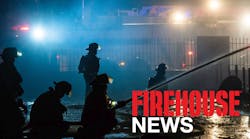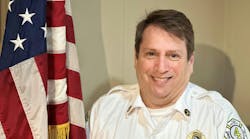The proposed Sprinkler Act applies only to retrofits and allows property owners to depreciate the cost of sprinklers on their federal tax returns over a period of 5 1/2 years. This is a truly significant reduction; under current tax laws, it takes 27 years to amortize the cost of retrofitting in residential buildings and 39 years in commercial and industrial property. The effort to pass the bill is being led by the National Fire Sprinkler Association (NFSA) and has strong support from every fire service organization.
Introduced in the House by Rep. Curt Weldon (R Pennsylvania) and Rep. James R. Langevin (D-Rhode Island), the bill is known as HR-1824 and has lined up 99 co-sponsors. It is being considered by the House Ways and Means Committee and, like all tax bills, had to be “scored” by the Joint Tax Committee to determine what impact it would have on the federal budget in terms of losing or gaining revenue. Their estimate is that the Sprinkler Act would cost the federal government approximately $2 billion in reduced tax revenue over a period of 10 years. That’s a loss of $200 million per year and makes it more difficult to pass at a time when the federal budget deficit has become a major political issue. Nevertheless, the bill’s sponsors in the House are optimistic about its chances for passage in this session.
The outlook in the Senate is not as good. Numbered as S-1566, it was introduced by Senators Jon S. Corzine and Frank R. Lautenberg, both Democrats from New Jersey. As this is written, they have not been able to attract any of the co-sponsors that are necessary for the bill to receive serious consideration in the Senate Finance Committee. What’s desperately needed is support from Republicans who control the Senate, especially those who sit on the Finance Committee. The NFSA is calling for a grass-roots effort to let Congress know that the fire service supports the Sprinkler Act and wants to see it passed.
Part of the problem is that the sprinkler industry is viewed by some as a “special interest” group that will profit from this bill. That’s absolutely true, but it also is an industry whose product saves lives by preventing fatal fires. Thousands of people have died in fires in buildings that did not have sprinklers; there never has been a multi-death fire in a building that was fully protected by a sprinkler system. From the fire service viewpoint, that’s all that counts. There is no way to measure the number of lives that are saved every day because sprinklers prevented small fires from becoming big fires. Sadly, we can add up the appalling death toll in buildings that should have had sprinklers, but were excluded by grandfather clauses.
Over a period of 50 years, I covered dozens of fire disasters that took hundreds of lives, and in every story I had to write, “The code did not require the building to have sprinklers,” or, “The new code requires sprinklers, but existing buildings were exempted when the code was passed.” Passing a retroactive sprinkler law that includes existing buildings is extremely difficult because the people who own and operate the buildings don’t want to spend the money. They have tremendous political clout and they use it to weaken sprinkler law by inserting grandfather clauses.
“It’s never a question of whether a building should be protected by sprinklers, it’s always a question of economics,” says James F. Dalton, a former fire marshal who serves as the NFSA’s director of public fire protection. A tax break for building owners who retrofit with sprinklers would be a huge step in overcoming the argument that sprinklers are too costly. The combination of a shorter depreciation schedule and lower insurance rates would make it economically feasible to eliminate grandfather clauses and push for mandatory retrofits in high-risk occupancies – such as nursing homes, night clubs and restaurants, college dormitories and off-campus housing, high-rise offices, hotels and apartments.
In the present political climate, the estimated loss of $200 million per year in federal tax revenue is a serious obstacle to overcoming in convincing Congress to pass the Sprinkler Act. However, it should be pointed out that in addition to saving lives, sprinklers save millions in tax dollars that are lost each year in fires that destroy businesses and deprive people of their jobs. And, there is no way to measure the cost of human lives.
It’s not possible to predict how many property owners will voluntarily decide to retrofit with sprinklers if they are offered a tax break. But the Fire Sprinkler Incentive Act would knock out the argument that retrofitting is too expensive. It could be the beginning of the end for those killer grandfather clauses, and for that reason alone it deserves all the support the fire service can muster.
Hal Bruno, a Firehouse® contributing editor, retired as political director for ABC News in Washington and served almost 40 years as a volunteer firefighter. He is a director of the Chevy Chase, MD, Fire Department and chairman of the National Fallen Firefighters Foundation.




